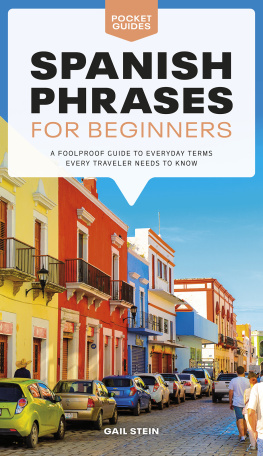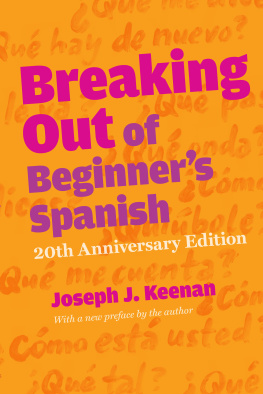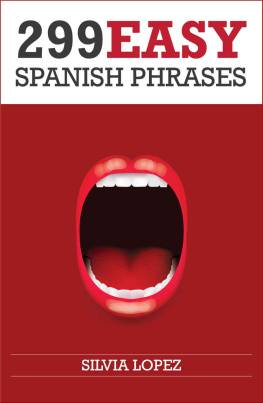Also by Joseph J. Keenan
Breaking Out of Beginners Spanish
Dichos!
THE WIT & WHIMSY of SPANISH SAYINGS
Joseph J. Keenan

UNIVERSITY OF TEXAS PRESS
Austin
Copyright 2019 by the University of Texas Press
All rights reserved
First edition, 2019
Requests for permission to reproduce material from this work should be sent to:
Permissions
University of Texas Press
P.O. Box 7819
Austin, TX 78713-7819
utpress.utexas.edu/rp-form
Library of Congress Cataloging-in-Publication Data
Names: Keenan, Joseph J. (Joseph John), 1960 author.
Title: Dichos! : the wit and whimsy of Spanish sayings / Joseph J. Keenan.
Description: First edition. | Austin : University of Texas Press, 2019.
Identifiers: LCCN 2018014801
ISBN 978-1-4773-1818-8 (pbk. : alk. paper)
ISBN 978-1-4773-1819-5 (library e-book)
ISBN 978-1-4773-1820-1 (non-library e-book)
Subjects: LCSH: Proverbs, Spanish. | Spanish languageTerms and phrases. | Spanish languageIdioms. | Proverbs, SpanishTranslations into English.
Classification: LCC PN6491 .K44 2019 | DDC 398.9/61dc23
LC record available at https://lccn.loc.gov/2018014801
doi:10.7560/318188
El que no oye consejo no llega a viejo.

Contents
Las gracias
There is no way to list all the friends and strangers over all these years who have shared these expressions with meor simply used them where I was in a position to overhear or read them. Nonetheless, to them I owe my thanks.
I owe a special thanks to Patricia Daz de Bezaury and her husband Juan, whose love for dichos is as strong as their skill for spotting mistakes I made in transcribing or interpreting them.
Great thanks are also due the University of Texas Press and my editor, Jim Burr. He and his colleagues encouraged me to collect and write about these dichos and made the process of doing so enjoyable. A special thanks to Nancy Warrington, my venerable copy editor, who had the patience and discernment to get deep inside the dichos and their translations. (Sorry for the sentence fragment!)
Thanks finally and always to my three beloved chitlins, Flavita, Andrs, and Adrin, for the constant inspiration to write down what little Ive managed to learnand then go try to learn some more.
Introduction
Its not uncommon to hear people say they love a language, but its not immediately obvious what that means or why we would love one collection of words, phrases, and syntax more than another.
And yet: I love Spanish. So let me try to explain.
A language helps us frame and interpret our world. It allows us to create concepts that without it would float forever out of reach. When we find just the right words to hook the concept, we can reel it in and hold it close. The world becomes a little more familiar, explicable, and meaningful.
Andoftenfunnier. Words arranged in certain ways can reshape our feelings of sadness or perplexity and humanize them, making us chuckle at our bad luck or marvel at the sinuous workings of the world. Sometimes well-arranged words reach the level of black humor, a weapon against an all-powerful universe that doesnt always seem to have our best interests in mind. And so we assemble some words in a way we call wit, laugh knowingly or grudgingly, and trudge on.
Words, well arranged, become dichos and their cousins: turns of phrase that take the dust and irritants of our daily lives and mold them into little linguistic pearls. For example, I could encourage you to take advantage of a situation to generate greater benefit for yourself. Or, I could tell you to Get stuck now while theres mud. I could tell you that things will get better, and that they could always be worse; or I could just tell you that God didnt give wings to scorpions.
And so it is that over the years and down through the centuries, new bits of wisdom and wit have been layered on, molding messages to new generations and new realities. Sometimes these expressions arise from an innovative reformulation of an old thought, and sometimes they represent new thoughts altogether. Sometimes TV shows, musicians, or politicians (often inadvertently) bring memorable new soundbites into the culture, and sometimes the wizards of marketing do. But always, somewhere, brains and tongues are conspiring to turn phrases into pearls.
This book is a compendium of a small part of this cultural trove of wisdom and wit, old and new, gleaned from the streets and salas of the Spanish-speaking world. Where I know the specific origin of a dicho, I mention it in the text, but many dichos origins are lost in the past or have sprung up spontaneously and spread virally across cultures and countries. Wit knows no borders, it seems.
Probably the greatest number of dichos in the book are from Mexico, or at least are used there, since that is where I have spent the most time living and listening. Many of these expressions are nearly universally recognized but appear in different forms in different places; I tried to choose the most widely used version, based loosely on total Google hits. That measure will change, and, in any case, you should listen for the local version wherever you are.
Above all, this book is a labor of lovemy love for the Spanish language and, by extension, for the people who speak it and use it to make sense (and maybe a little fun) of our mixed-up modern world.
If you are a fan of language and of the magic that words can create, then this book is for you. If you are learning Spanish, these expressions will help you understand it a bit more deeplyand hopefully help you enjoy learning it. If you already are intimate with Spanish, these dichos may rekindle some long-ago memories. And no doubt the book will remind you of a dozen more dichos that are meaningful to you.
Finally, a clarification: There is a debate in academic circles about what constitutes a dicho as opposed to some of its cousins, like the refranes, sentencias, proverbios, adagios, aforismos, and others. It is an interesting debate, but I have chosen to ignore it for the purposes of this book. Here Im calling them all dichos. After all, a rose by any other name...
A Adryana:
mi tctica es
hablarte
y escucharte
construir con palabras
un puente indestructible.
MARIO BENEDETTI
1. Que what?
To get us started, lets look at some dichos that may leave you scratching your head at whether they mean what you think they say, or say what you think they mean, or...
Oh, forget it. Yogi Berra wouldve understood them.
Ahora que se haba acostumbrado a no comer, va y se muere el burro.
Just when it was getting used to not eating, my burro up and dies on me.
Okay, so it doesnt exactly roll off the tongue, but its an amusing way to poke a little fun at yourself when a neat plan of yours goes awry in a way that anyone could have predictedand that you probably did yourselfbefore going ahead anyhow.
A veces me siento a pensar, y a veces noms me siento.
Sometimes I sit and think, and sometimes I just sit.
Zen.

Next page













